The original global intelligence agent Global intelligence agent is included in the topic # Everything related to Judaism 7# China with a little knowledge of you 10
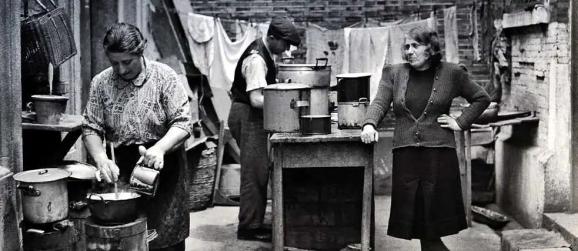
Jews in China.
Author | Pei Lin
Editor | |Thomas
The Jewish nation originated in Canaan (present-day Palestine). In the first century A.D., due to the uprising against the Roman Empire, it was driven out of its hometown and scattered in all directions. From then on, until the founding of Israel in 1948, they drifted for almost two thousand years.
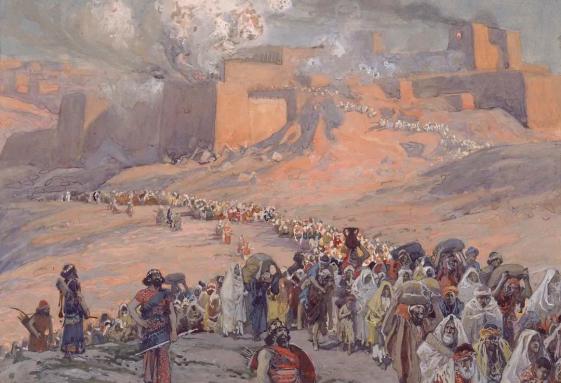
▲ In 70 AD, the resistance to Roman rule failed, and the Jews were driven out of their homes and scattered in all directions.
The vast majority of Jews are scattered in Eastern Europe, the Middle East and the Mediterranean, and some Jews continue to migrate to China in the farther east. Although the Silk Road is long, it has already spread China’s influence to every corner of the world. According to modern archaeological discoveries, as early as the Zhou Dynasty, Jews had arrived in China to engage in trade.
At the beginning of the 11th century, Kaifeng, the capital of the Northern Song Dynasty, formed the first Jewish community, and gradually achieved the same social status as the Han people. From modern times to World War II, the number of Jews in China reached tens of thousands, reaching a historical peak.
After World War II, the vast majority of Jews left China, so that a brand-new minority was not formed, and only a few Jewish descendants were integrated into the Chinese nation. What happened in the meantime?
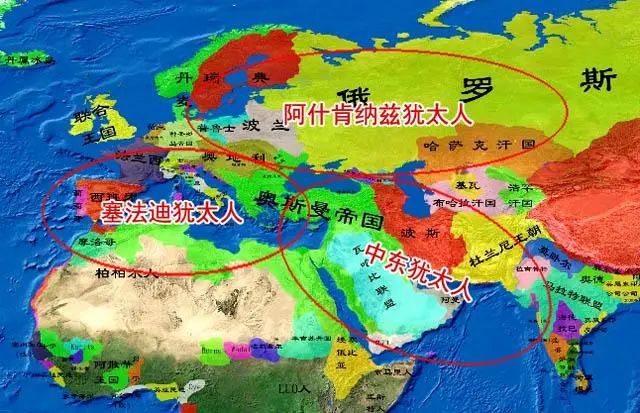
▲ Schematic diagram of the distribution of Jews in the world after the Great Diaspora
I the rise and fall of the Jewish community in Kaifeng
According to archaeological experts, as early as the Zhou Dynasty and the Qin and Han Dynasties, there were Jews doing business in the Central Plains. It has been confirmed by archaeological excavations that a large number of Jews arrived in China in the Tang Dynasty.
At the beginning of the 20th century, British and French explorers discovered Hebrew letters and prayers in Xinjiang, and the writing time was determined around 718 AD, that is, the early reign of Emperor Xuanzong of the Tang Dynasty. Experts believe that these Jews came to China to do business through the overland Silk Road.
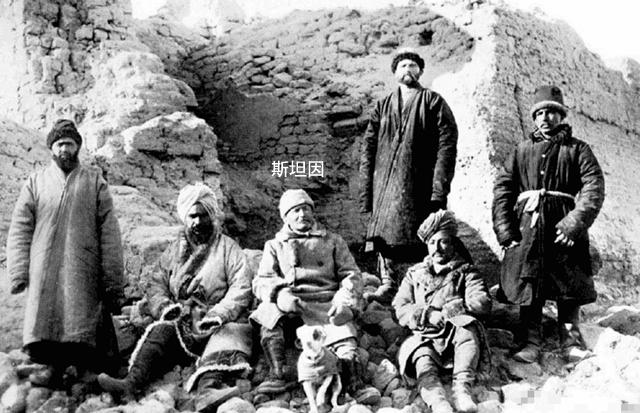
▲ The British explorer Stein discovered the earliest Hebrew letter, and he is also one of the biggest cultural relics thieves in China.
The northern song dynasty failed to regain control of the western regions, and the silk road on land was no longer safe and prosperous, and the silk road on the sea rose accordingly. In October 998, a group of Jews arrived in China by Arab merchant ships, then passed through Quanzhou and Yangzhou, and arrived in Kaifeng, the capital at that time.
Modern research shows that these Jews should belong to the Jewish community in the Persian region. Their preserved Jewish scriptures are consistent with Persian Jews, and their DNA is closer to Middle Eastern Jews. This view occupies a dominant position in the current academic circles.
The Song Dynasty was a relatively open and tolerant dynasty. Arabs, Persians, Europeans and other foreigners were not discriminated against, and their business was unimpeded. They could also become officials in the DPRK, and Jews were no exception.
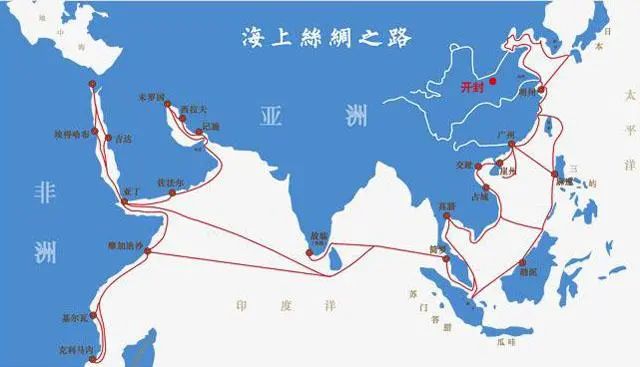
▲ Jews from the Middle East arrived in Kaifeng through the Maritime Silk Road.
Because of good management, Jews began to buy real estate, formed their own community in a street in Kaifeng and Heshun District, and their lives were quite rich. Kaifeng people call Jews "people who give happiness", which is the transliteration of "Israel" by Song people.
Kaifeng people like exotic goods brought by Jews, but they are also curious about their religious rituals and customs, but they are not offended at all, which makes Jews feel safe and satisfied. In order to gain the official recognition of the Song Dynasty, Jews learned from other foreigners and made an audience with Song Zhenzong through the Ministry of Rites, hoping to live in Kaifeng forever.
In 1008, Song Zhenzong issued a letter, saying, "It’s midsummer for me, and I will abide by the ancestral style and leave the capital of song dynasty", allowing them to take the imperial examination and keep their own customs. In 1127, Song Huizong ordered that one hundred and twenty pieces of silver be appropriated to help them build a synagogue.
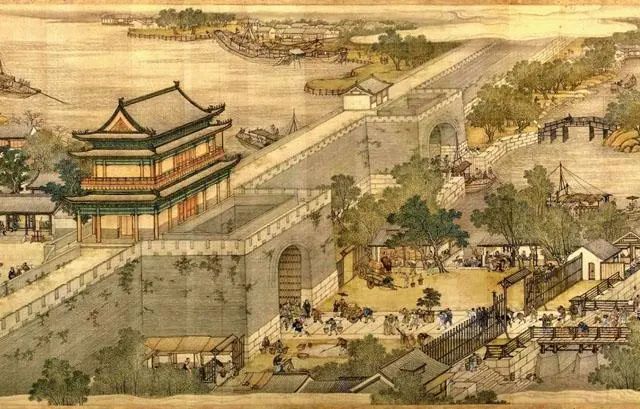
▲ In the Qingming Riverside Map, Kaifeng was the largest city in the world at that time, accommodating all foreign nationalities.
Unfortunately, before this hall was built, Jurchen from the north had already arrived in Enemy at the Gates, breached Kaifeng, and captured Emperor Huiqin, and the Northern Song Dynasty ended, which was known as the "Jingkang Change".
The Jewish community in Kaifeng has just emerged, with a population of just over 500, and it has to face a brand-new "Jin" dynasty. Jews chose to stay in Kaifeng and continue to run their own business. In fact, due to the lack of talents in financial management in the "Jin" and "Yuan" Hu dynasties, the status of Jews has been improved.
Jin Dynasty Emperor Wan Yanliang intended to follow the example of the Northern Song Dynasty in issuing paper money "Jiaozi", but all the coin-making officials in the Song Dynasty fled south, and Wan Yanliang was unavailable. Therefore, some ministers proposed that Jews should finish this work.
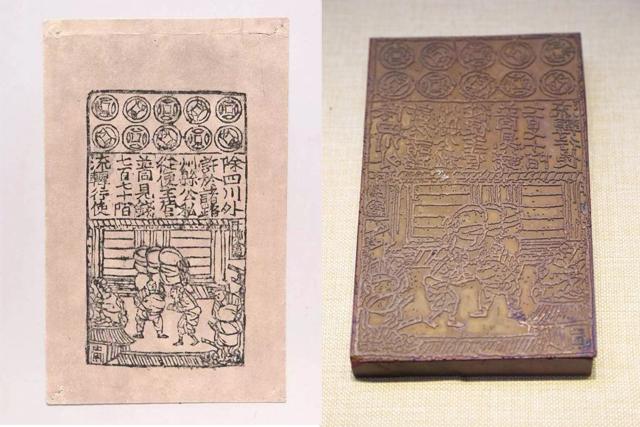
▲ Jin Dynasty’s "Jiaozi" and its impression. The Jews designed the first edition of "Jiaozi" for the Jin Dynasty in the style of the Northern Song Dynasty.
Jews learned from the mature experience of paper money in the Northern Song Dynasty, coupled with their own business talent, and designed the Jin version of "Jiaozi" in just a few days. In addition, they also suggested that the Jin Dynasty set up a special paper money management institution "Pedestrian", which can be regarded as the embryonic form of the bank and has some functions of the central bank.
In 1163, in order to reward the contribution of the Jews, the Jin Dynasty allocated funds to build the first synagogue in the Hutong of Kaifeng. After the destruction of gold in the Yuan Dynasty, Jews continued to serve the Yuan Dynasty, which was also recognized by the Yuan Dynasty. In 1279, the hall was rebuilt, with an area of more than 10,000 square meters.
The real peak of the Jewish community in Kaifeng was in the Ming Dynasty, which grew to more than 500 households with more than 5,000 people. They not only gave themselves the Chinese surname, but also became officials through the imperial examination, and began to accept Confucianism, naturalized Chinese civilization, and their social status was completely equal to that of Han people.
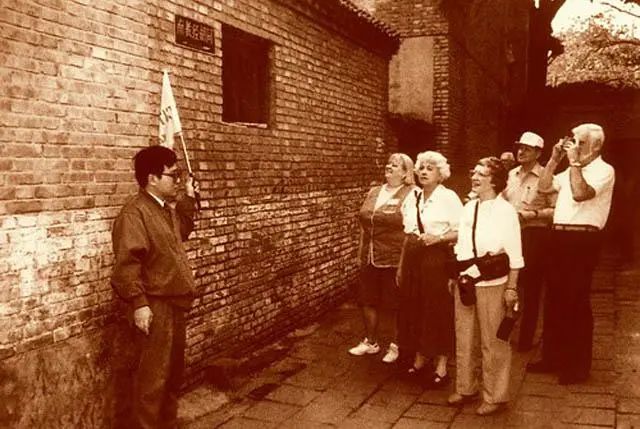
▲ At the end of the 20th century, overseas Jews visited the Jewish old site in Kaifeng.
In other parts of the world, Jews insist on using their own Hebrew language and writing, but this situation has changed in China. During the hundreds of years from Song Dynasty to Ming Dynasty, Kaifeng Jews gradually learned Chinese in their long-term common life with Chinese. What’s more, Chinese never discriminates against them, which makes them have no reason to refuse to learn Chinese.
The problem of intermarriage with Chinese also experienced the process from prohibition to relaxation. After the Song Dynasty, there were wars in China, and there were few foreign Jews. In order to maintain the reproduction and survival of the Jewish community, they began to intermarry with Chinese. According to statistics in the late Ming and early Qing dynasties, Kaifeng Jews married at least 40 non-Jewish women.
In language, marriage, culture, employment and so on, Kaifeng Jews are more and more like Chinese. By the end of the Qing Dynasty, Zhao Jincheng, the leader of Kaifeng Jews, did not know Hebrew. They still kept their ancestors’ scriptures and genealogy, but no one gathered for church again and the synagogue was in ruins.
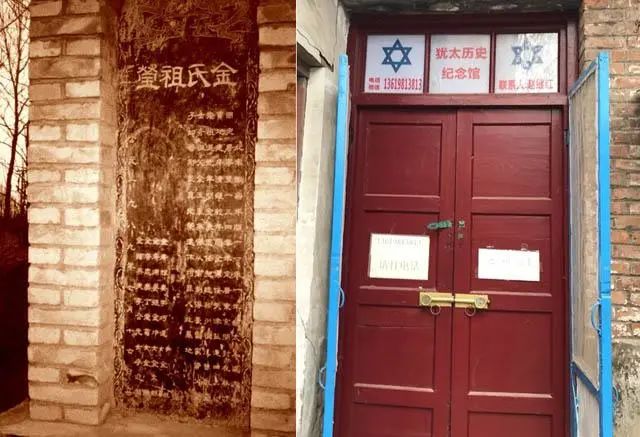
▲ Jewish memorial hall and Jewish genealogy in Kaifeng city.
In 1854, the Yellow River flooded, the Kaifeng synagogue was razed to the ground, religious ceremonies stopped completely, the whole Jewish community disintegrated completely, and some remaining cultural relics were snapped up by foreign missionaries. The former site of the synagogue was later sold and turned into the present Kaifeng Chinese Medicine Hospital.
At this point, the Jewish community in Kaifeng was founded in 998 AD, dissipated in the early 20th century, went through a whole thousand years, and finally completely integrated into the Chinese nation. At present, there are about 200 descendants of Jews in Kaifeng. Some people are still trying to get back the memories of their ancestors, but they all think they are Chinese, just to find their roots.
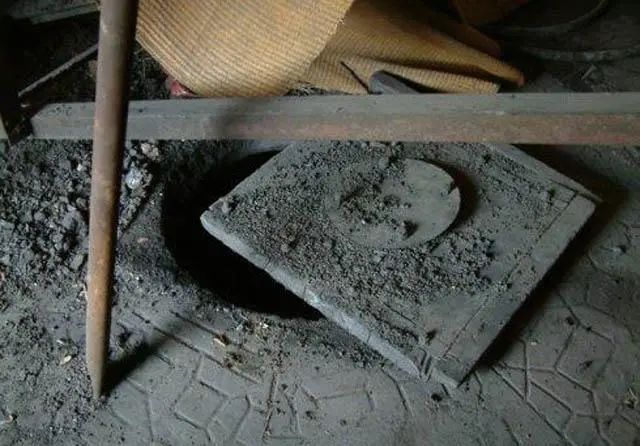
▲ The last relic of Kaifeng Jewish synagogue is an ancient well in Kaifeng Chinese Medicine Hospital.
Second, Jewish businessmen doing business in China in modern times
After being forced to leave Canaan, Jews scattered in all directions. By the middle ages, it had been divided into three main groups: Eastern Jews distributed in the Arab region; Sefadi Jews are distributed in the Mediterranean region; Ashkenaz Jews are distributed in continental Europe. Since modern times, the global colonization activities of Europeans have made the activity areas of three parts of Jews overlap.
Many Sefadi Jews have joined Britain, France and other nationalities. They followed the footsteps of European colonists and established business networks around the world. As soon as China was opened to the world by the Opium War, Sefadi Jews beat us to it and made investments and business in China. Sassoon was the representative among them.
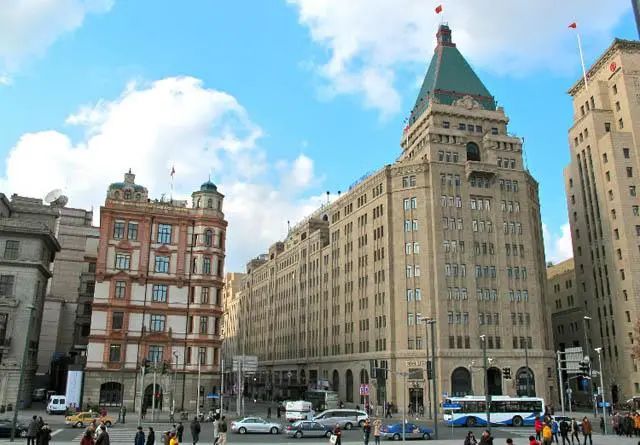
▲ Sassoon Building, located at the Nanjing intersection of the Bund, is now part of the Peace Hotel.
David sassoon, the founder of Sassoon Foreign Firm, is a British Jew and one of the British businessmen who export opium to China the most. After 1840, Sassoon opened foreign firms in Hong Kong, Guangzhou and Shanghai, especially in Shanghai, which was a great success, dealing in opium, cotton yarn, arms and so on, with branches all over the country.
The flourishing development of the Sefadi Jewish business group in Shanghai led to the establishment of the Jewish community in Shanghai, including Jewish cemeteries, synagogues and schools. In 1910, the Shanghai Jewish Association was formally established, and then a larger synagogue was built and Jewish newspapers were founded, which played a role in rallying Shanghai Jews.
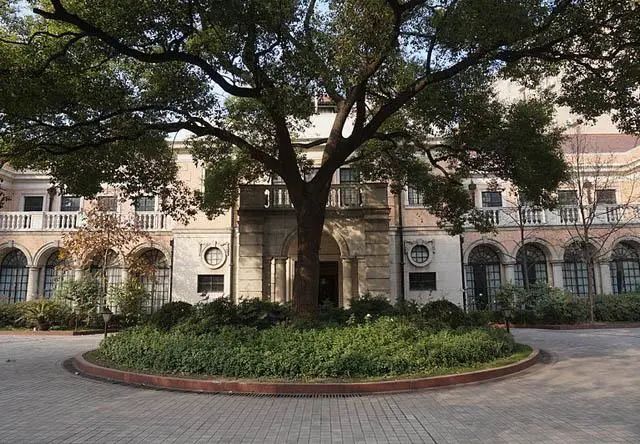
▲ The former site of Shanghai Jewish General Association, founded in 1911, is located at No.722 Nanjing West Road.
The Shanghai Jewish community, dominated by Sefadi Jews, is relatively small in number, but has strong economic strength. Their main purpose is charity relief, and they also set up the Shanghai Jewish Saint Society, which specializes in this work. The agency opened a hospital in 1934 to help Jews living in Shanghai.
Almost at the same time that Sefadi Jews established the Shanghai community, another group of Jews also established their own community in China. They are Jews from Russia and belong to Ashkenaz Jews on the European continent. Unlike the wealthy Sefadi Jews, these Russian Jews came to China to take refuge.
Third, Russian Jews who took refuge in China in modern times
At the end of 19th century, Ashkenaz Jews were mainly distributed in Germany, Poland, Russia and other countries, among which the living environment of Russian Jews was worse. The czar government not only forced them to convert to the Orthodox Church, but also imposed heavy taxes and military service. The constant wave of anti-Semitism in Russia also frightened Jews.
Just in order to develop the Far East and encourage Europeans to emigrate, the czar government adopted a more relaxed ethnic policy in the Far East. As a result, Jews poured into the Far East, and the Soviet Union even established a Jewish autonomous prefecture on the Sino-Russian border. Some Jews also entered Harbin, a city in China occupied by Russia, and the Shanghai Concession.

▲ Harbin Jewish Church, which has been changed to Jewish History and Culture Museum.
Before the October Revolution in Russia, more than 6,000 Jews lived in Harbin and operated hundreds of industrial and commercial enterprises. After the "October Revolution", a large number of wealthy old Russian aristocrats fled Russia for fear of the red regime, and many of them came to Harbin and Shanghai.
The number of Russian Jews in Harbin has soared to more than 20,000, and the number of Russian Jews in Shanghai has also exceeded 4,000. There are also some Russian Jews who moved from Harbin to Tianjin Concession, reaching 3500 at most.
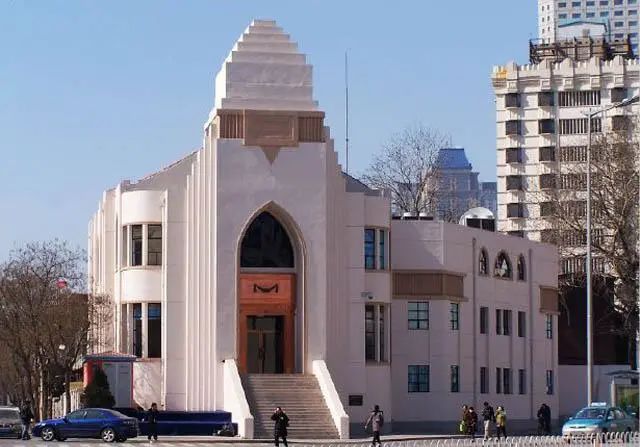
▲ Tianjin synagogue, located at the intersection of Nanjing Road and Zhengzhou Road in Heping District.
Russian Jews in Shanghai did not completely join the Sefadi Jewish community from the beginning, and kept their independence. After their number was greatly increased, they set up their own independent organization in 1932.
Compared with the charity function of Sefadi Jewish community, Russian Jews pay more attention to the propaganda and activities of Zionism. Zionism is the idea of returning to Palestine and establishing a Jewish homeland. Russian Jews all over China have established Zionist organizations to unite Jews.
Russian Jews are the majority of modern Jews who have lived in China for a long time. They came to China because of persecution and were full of enthusiasm for Zionism.
Fourth, Jewish refugees who took refuge in China during World War II
In 1933, the German Nazis came to power, showing an obvious anti-Semitic tendency. Some German Jews began to leave their motherland and went to relatives and friends all over the world. By the summer of 1937, about 1,500 Jews had arrived in Shanghai by normal sea.
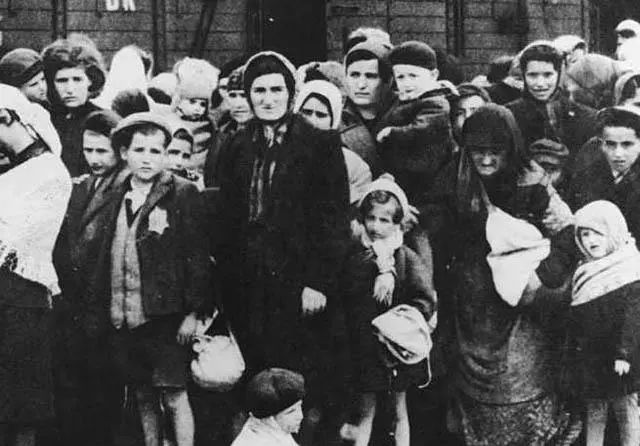
▲ Nazi Germany set off a climax of anti-Semitism, and Jews fled Germany and German-controlled areas.
In August 1937, Germany set off a large-scale wave of anti-Semitism, and the number of Jews coming to China increased sharply. In two years, at least 20,000 Jews arrived in Shanghai. When the world closed its doors to Jews, Shanghai opened its doors to these Jewish refugees for two reasons:
The first is that Shanghai was in a delicate period at that time. After the Battle of Songhu in 1937, most of Shanghai was occupied by the Japanese, and the China government lost its jurisdiction over Shanghai. As a result, Shanghai has become a "free port" and can enter without any proof or guarantee.
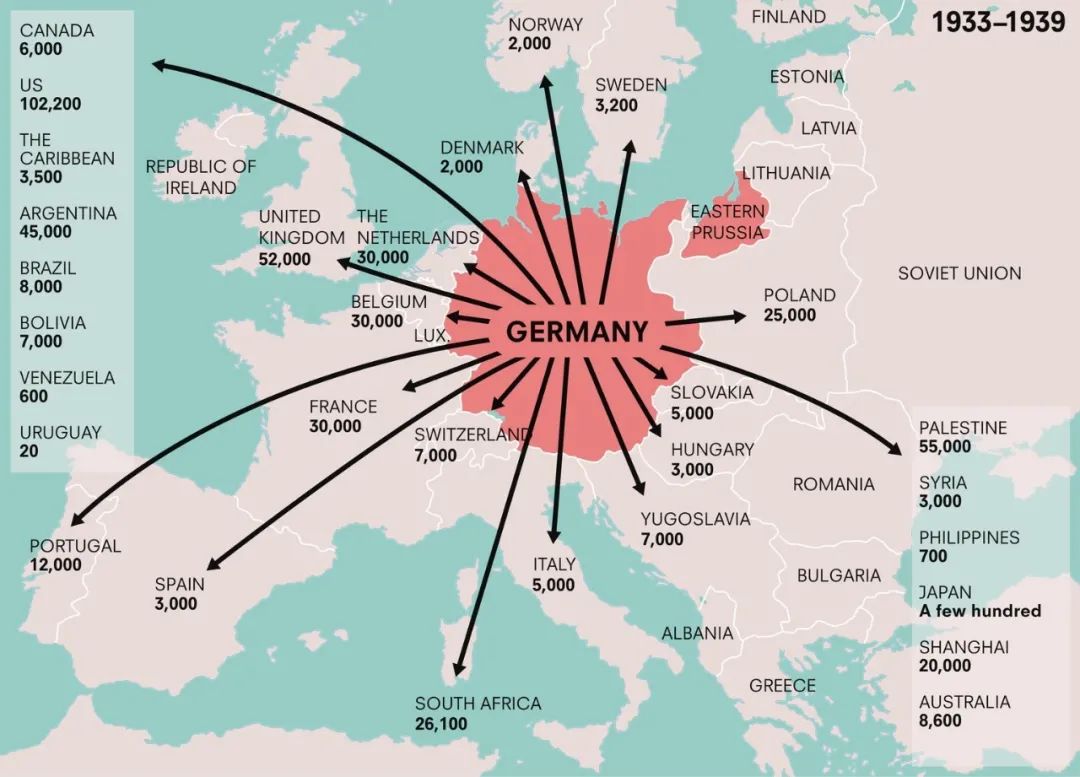
▲ Jews fled Nazi Germany.
The second reason is the act of He Fengshan, Consul General of China in Austria. Seeing that the Nazi persecution of Jews is getting worse, He Fengshan, Britain and the United States and other countries refused to accept more Jewish refugees, issued Chinese visas to a large number of Austrian Jews to help them leave this country that was about to be annexed by the Nazis.
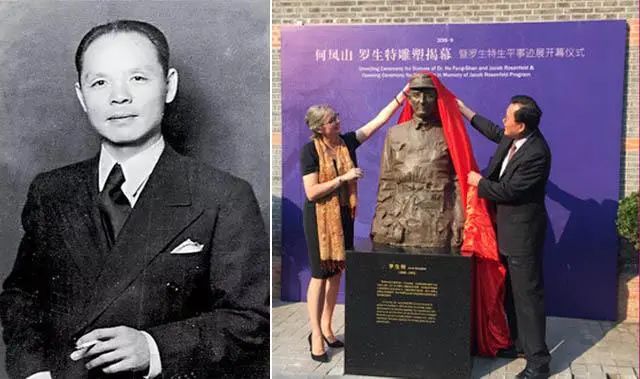
▲ China diplomat He Fengshan, who saved a large number of Jews from escaping from the tiger’s mouth, and a sculpture commemorating him.
Due to the large number of Jewish refugees and poor economic conditions, most of them can only live in Hongkou District in the north of the public concession. Under the pressure of the Nazis, the Japanese occupation authorities set up an isolation zone in 1943, limiting Jewish refugees to live only in Hongkou and Yangshupu areas.
Despite the hard years of Japanese occupation, Shanghai residents still tried their best to help Jewish refugees. They vacated their houses for Jewish refugees to live in and treat Jewish refugees injured in the war.
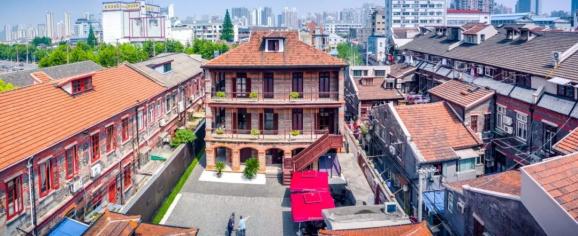
▲ Memorial Hall for Jewish Refugees in Hongkou District, Shanghai, the main settlement of Jewish refugees in that year.
At first, Jewish refugees joined the early Russian Jewish community. With the increase in the number of refugees and the complexity of nationality, refugees have set up their own associations and become the main organizations to contact and help Jewish refugees.
Generally speaking, although the Jewish refugees who took refuge in Shanghai are hard, their life safety is still guaranteed. Many people do business in Shanghai and their lives are not so bad. So they spent the whole World War II.
V. The disappearance of Jewish communities in China.
On May 14th, 1948, the State of Israel was proclaimed, and the Jews finally had their own homeland. Three Jewish communities in modern China also welcomed their own homes.
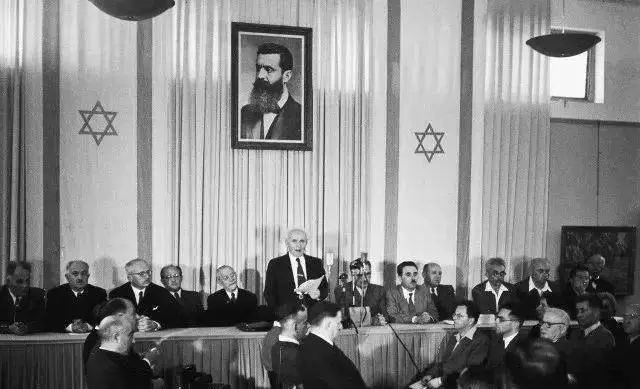
▲ On May 14, 1948, Israel announced the founding of the country in the birthplace of Palestine (Canaan).
Sefadi Jewish businessmen, mainly British and American, became enemies of the Japanese authorities after the outbreak of the Pacific War. They were put into concentration camps and all their property was confiscated. After World War II, as the privileges of Shanghai Concession and foreign powers in China were taken back by China, Sefadi Jews lost their original advantages and gradually moved their property and business to Hong Kong, and their organization and influence basically disappeared.
After the Japanese occupation of the three northeastern provinces, the Russian Jewish community in Harbin began to flee or move southward in large numbers, leaving only 1,100 people in 1937. When the Soviet Red Army liberated the Northeast, the Jewish community was cancelled and all the Jews were scattered.
The Russian Jewish community in Shanghai began to disintegrate during the War of Liberation. Before the liberation of Shanghai, their number was less than 1000. In 1956, the last synagogue in Shanghai ceased to be used, which marked the complete demise of the Jewish community.
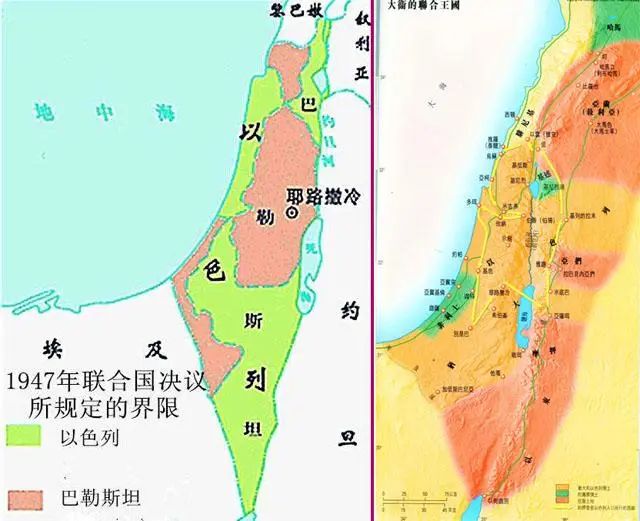
▲ Schematic diagram of the comparison between the State of Israel stipulated by the United Nations and Israel in the period of David in the 10th century BC.
The Jewish refugee community that took refuge in Shanghai in World War II began to disintegrate after the war. Refugees are returning home one after another, and many people have responded to the Zionist call and gathered in Palestine to prepare for the establishment of an Israeli state.
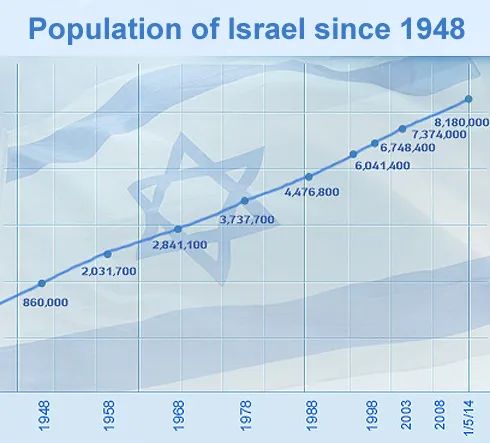
▲ The population growth trend of Israel since 1948.
At this point, the Jews in Chinese mainland basically dissipated, but the love between Jews and China did not end. Many Jews who have lived in China call themselves "Chinese Jews". Former Israeli Prime Minister Olmert is the second generation of "Chinese Jews", and his parents were born in Harbin.

▲ The establishment of the State of Israel has finally realized the Jewish dream of the motherland that lasted for two thousand years.
To this day, in Israel, the United States and other places, there are still active international friendship organizations commemorating the years of China and Shanghai. Many Jews who lived in China in those days came to China to seek their roots with their children, so that they could remember this precious time.
Long-time author | Pei Lin
A veteran lover of history
Editor in charge | |Thomas
Graduate of London School of Economics and Political Science | Editor-in-Chief of Global Intelligence
—(End of full text)—
Unauthorized reprinting is prohibited.
Original title: "Jews have lived in China for thousands of years, but why have they disappeared now? 》
Read the original text